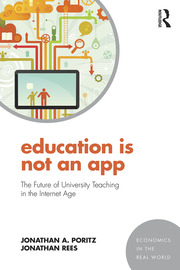Plus de 524 000 visiteuses et visiteurs par an!
Menu
Plus de 524 000 visiteuses et visiteurs par an!
Plus de 524 000 visiteuses et visiteurs par an!

Whilst much has been written about the doors that technology can open for students, less has been said about its impact on teachers and professors. Although technology undoubtedly brings with it huge opportunities within higher education, there is also the fear that it will have a negative effect both on faculty and on teaching standards. Education Is Not an App offers a bold and provocative analysis of the economic context within which educational technology is being implemented, not least the financial problems currently facing higher education institutions around the world. The book emphasizes the issue of control as being a key factor in whether educational technology is used for good purposes or bad purposes, arguing that technology has great potential if placed in caring hands. Whilst it is a guide to the newest developments in education technology, it is also a book for those faculty, technology professionals, and higher education policy-makers who want to understand the economic and pedagogical impact of technology on professors and students. It advocates a path into the future based on faculty autonomy, shared governance, and concentration on the university's traditional role of promoting the common good. Offering the first critical, in-depth assessment of the political economy of education technology, this book will serve as an invaluable guide to concerned faculty, as well as to anyone with an interest in the future of higher education.
Poritz, J.A. & Rees, J. (2017). Education is not an app: The future of university teaching in the Internet age. London: Routledge.
Reconnaissance du territoire autochtone
Contact North | Contact Nord reconnaît et respecte que son travail, ainsi que celui de ses partenaires communautaires, se déroule sur les territoires traditionnels des peuples autochtones à travers l’Ontario.